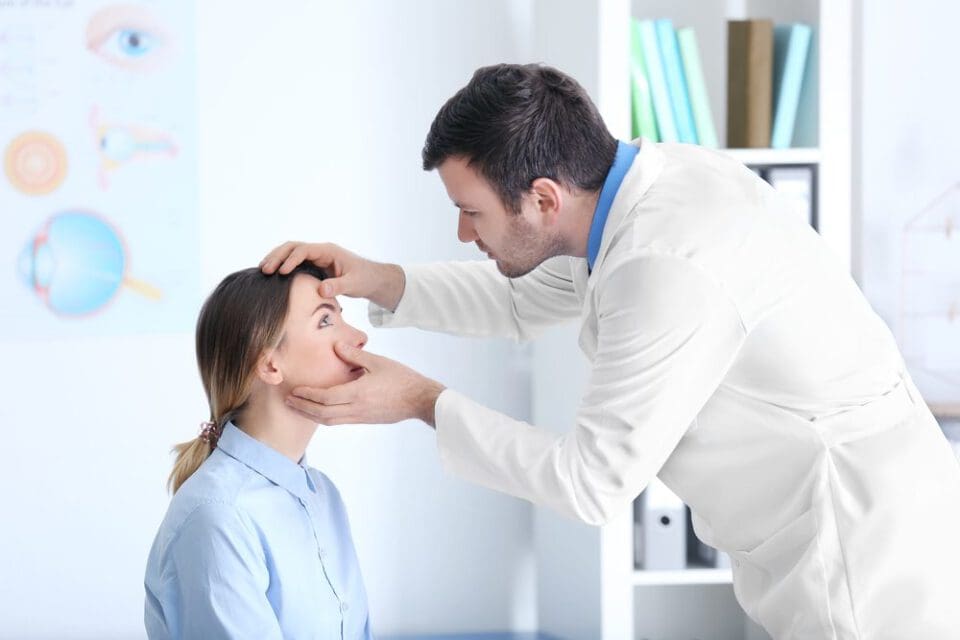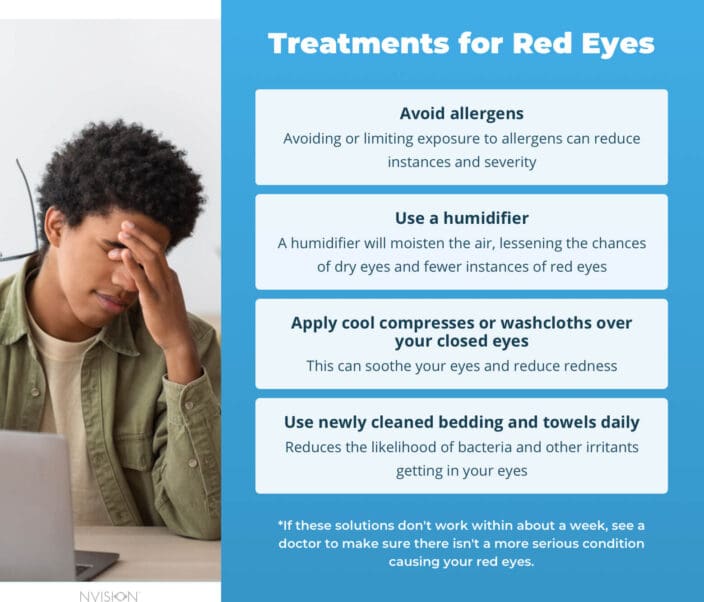
Medically Reviewed by Tom Tooma, M.D., Founder/Medical Director
How to Get Rid of Red Eyes (Without Eye Drops)
Home / Vision Education Center /
Last Updated:

Medically Reviewed by Tom Tooma, M.D., Founder/Medical Director
While often not a serious health risk, red eyes can still cause significant irritation, and they can be unattractive. You can often get rid of red eyes without eye drops by avoiding allergens and other irritants, using cool compresses on your eyes, getting more sleep, and using a humidifier.
Table of Contents
If these solutions don’t work within about a week, see a doctor to make sure there isn’t a more serious condition causing your red eyes.
While eye drops can quickly relieve red eyes, many people don’t want to continually use eye drops. Eye drops don’t address the underlying issue causing eye redness.
What Are Red Eyes?
Red eye is an eye health symptom in which blood vessels on the eye’s surface become irritated or inflamed. It is generally accompanied by other symptoms, such as these:
- Itchiness
- Pain
- Teary eyes
- Irritated or sore eyelids
- The feeling of something in the eye
You deserve clear vision. We can help.
With 135+ locations and over 2.5 million procedures performed, our board-certified eye surgeons deliver results you can trust. Your journey to better vision starts here.
Usually, red eyes are not serious, but if symptoms persist for more than a few days, cause serious discomfort, or impact your vision, you should see a doctor as soon as possible.

Causes of Red Eyes
Multiple eye health conditions can cause red eyes. The most common include:
Allergies & Other Irritants
Some of the most common causes of red eyes are allergies to things such as pollen or pet dander. The body produces histamines to help combat these allergens, which it interprets as threats. This process causes blood vessels in the eye to dilate, creating a reddening effect as well as irritation.
More serious irritants that can cause red eyes include exposure to chemicals, such as cleaning products, or smoke. In these cases, it is usually best to treat the exposure as serious even if you don’t notice any other significant symptoms.
Burst Blood Vessel
Sometimes blood vessels can burst in the eye, creating an effect called a subconjunctival hemorrhage. This can make the white of the eye look blood red due to blood leaking, but this condition is usually less serious than it seems.
Infection or Conjunctivitis
Conjunctivitis, an eye infection, can cause the eye to appear red and become irritated. Eye infections vary in severity, with some being very mild and others requiring immediate medical attention.
Dry Eyes
Dry eyes are a very common eye health symptom that can cause red eyes. Essentially, the eye becomes irritated when it experiences a problem with its natural lubrication process.
The biggest indicator of dry eyes is usually when the eyes feel sore and are watery, which may also cause blurred vision. Dry eye usually isn’t serious on its own, but it can be very irritating.
Blepharitis (Eyelid Inflammation) & Other Eyelid Complications
If your red eye is accompanied by eyelid complications, such as swelling, itchiness, or drooping, it is usually not serious. For example, insect bites can cause swelling and itchiness on the eyelid, which may then impact the eye as well.
If you are unsure of the cause of your inflammation, see a doctor.
Ingrown Eyelashes
Sometimes, eyelashes grow inward rather than outward. As the eyelash rubs against the eye and eyelid, this can cause irritation and potentially introduce bacteria to the eye.
Lack of Sleep
When you don’t get enough sleep, your eyes may not get sufficient oxygen, resulting in eye dryness. Since your eyes are open for longer, they are also getting less lubrication, further contributing to dryness. This can lead to persistent redness.

How to Clear Red Eyes Without Eye Drops
If you want to clear red eyes without eye drops, these are some common solutions to address red eyes:
- Avoid allergens. Since allergens are a common cause of red eyes, simply aiming to avoid or limit exposure to them can reduce instances and severity of red eyes.
- Use a humidifier. A humidifier will moisten the air, lessening the chances of dry eyes. Overall, this can result in less eye dryness and fewer instances of red eyes.
- Apply cool compresses or washcloths over your closed eyes. This can soothe your eyes and reduce redness.
- Use newly cleaned bedding and towels daily. This reduces the likelihood of bacteria and other irritants getting in your eyes, causing redness.
Notably, these solutions are primarily for red eyes caused by environmental irritants like dust. In many cases, artificial tears may still help supplement your home treatment.
Potential Complications
The above treatments don’t carry many risks beyond potentially delaying expert treatment. If these treatments will help, you should generally see improvement within a week.
If you don’t see improvement, the cause of your red eyes may be more serious than home treatments alone can resolve.
You deserve clear vision. We can help.
With 135+ locations and over 2.5 million procedures performed, our board-certified eye surgeons deliver results you can trust. Your journey to better vision starts here.
When to See a Doctor for Red Eyes
Some causes of red eyes require a doctor’s intervention to solve, including ingrown lashes and all but very mild eye infections. You should also see a doctor right away if you develop red eyes following an eye injury, as this can sometimes cause a hyphema, an eye health condition that may look like a burst blood vessel but is more serious.
Again, if your red eye symptoms don’t resolve within about a week, it is generally time to see a doctor. They can make sure you don’t have a serious eye condition, and they can also recommend a more effective treatment for any symptoms causing discomfort.
You should see a doctor immediately if you experience serious pain, any vision loss, or notice a sudden worsening change in your symptoms. In some cases, this can signal you have an eye health issue that may cause permanent vision loss if not treated promptly and by a medical professional.
Prevention of Red Eyes
While not all causes of red eyes are easily preventable, following some basic best practices can help reduce your chances of developing them. Try these tips:
- Get tested for allergies, allowing you to better avoid triggers.
- Practice good hygiene, especially washing your hands frequently.
- Follow all recommendations when using contacts, including taking them out before sleeping or swimming.
- Always wear appropriate eye safety gear, such as goggles, in environments that may send debris toward your eyes.
- Follow a doctor’s recommended treatment for its entire duration even if symptoms disappear before it is completed.
Red Eyes FAQs
What are the common causes of red eyes?
The most common causes of red eyes include irritants and allergies. These can range from pollen and chlorine to fumes, smoke, and pet dander.
Excessive alcohol consumption, contact lens use, swimming, pregnancy, and overuse of eye drops are additional common causes of red eyes. Infections, hemorrhages, and injuries can also trigger red eyes.
Are red eyes a serious health concern?
No, in most cases, red eyes will dissipate in a day or two. If they don’t improve, see a doctor.
When should I visit the doctor?
If your red eyes are accompanied by eye pain, see a doctor. Similarly, if you have had a recent head injury, chemical injury, or reduction in vision, you should visit a doctor for evaluation. If you regularly experience pain around your eyes, see a doctor.
If eye redness lasts more than a couple days, it’s best to have a medical exam.
What are the best treatments for red eyes?
Home remedies, like applying cool compresses and resting your eyes, can help to alleviate eye redness. You can also aim to get more sleep.
Eye drops can treat eye redness quickly, but they don’t address the underlying cause of the redness. Appropriate treatment will depend on the cause. For example, if you have a bacterial infection, you’ll need antibiotic eye drops.
Does lack of sleep cause red eyes?
Lack of sleep can contribute to red eyes. When you are tired, your eyes can be dry and itchy, and this can lead to eye redness.
You deserve clear vision. We can help.
With 135+ locations and over 2.5 million procedures performed, our board-certified eye surgeons deliver results you can trust. Your journey to better vision starts here.
References
- Eyelid Problems. (October 2020). UK NHS.
- Home Remedies for Bloodshot Eyes. (May 2021). American Academy of Ophthalmology.
- Red Eye. (March 2022). UK NHS.
- What Is Hyphema? (May 2022). American Academy of Ophthalmology.
- The Allergic Eye: Recommendations About Pharmacotherapy and Recent Therapeutic Agents. (August 2020). Current Opinion in Allergy & Clinical Immunology.
- What Is a Subconjunctival Hemorrhage? (May 2022). American Academy of Ophthalmology.

Dr. Tooma, the founder of NVISION® Eye Centers, has performed well over 130,000 LASIK surgeries, making him the most experienced LASIK surgeon in the Western United States.
This content is for informational purposes only. It may have been reviewed by a licensed physician, but is not intended to serve as a substitute for professional medical advice. Always consult your healthcare provider with any health concerns. For more, read our Privacy Policy and Editorial Policy.